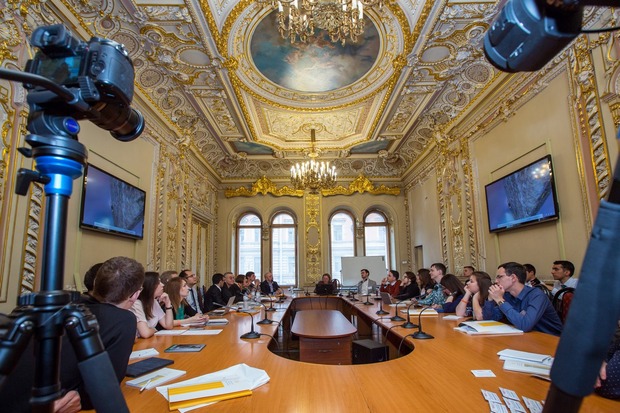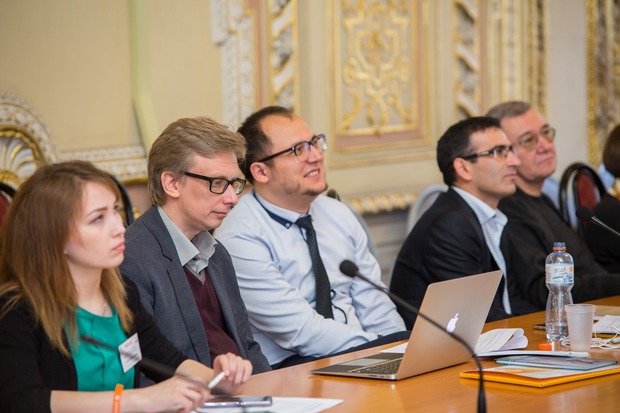3rd Islam in Russia: search of new horizons
Expert in Eastern studies Alfrid Bustanov’s column about recently held summer school of the European University
The next summer school of the European University called Islam in Russia recently ended in Saint Petersburg. In his new column, Realnoe Vremya's op-ed contributor Alfrid Bustanov who teaches at this university draws some conclusions of the 3-year-old work of the school.
The next summer school of the European University Islam in Russia recently ended in Saint Petersburg. Thanks to the support of TAIF Group of Companies and Ziyavudin Magomedov's Peri foundation we have gathered for the third time (earlier we were in Kazan and Makhachkala). It is already clear that it is an event with history and a mission. I will tell about them and why it is necessary.
Import from Amsterdam
The idea of holding the summer school appeared on Amsterdam streets, in the Netherlands. My friend Danis Garaev and I discussed perspectives of Islamic studies in Russia several years ago. We came to a conclusion that the absence of a targeted work with young people is the main problem. What often happens is that there are talented and interested guys, but nobody works with them, so they go to another area. This is why we decided to try to create such an intellectual site where our experienced colleagues could find pupils and then informally ''lead'' them on the way of science. The sooner this process began, the better it was.

Initially, we founded several principles of the summer school. First of all, it needs to orientate to international academic standards. This is why the English language was needed. Secondly, we decided to make the school mobile to not only attract guys from different places but also actively use existing potential in regions. Thirdly, it is a combination of classic themes linked with research of written monuments and modern-day problems as well as diversity of theoretical approaches. Sticking to these principles justifies itself: we got good opinions of students and we already see successful students of the summer school with their own interests and plans.
Shower of star scientists in Golden Hall
A real star team gathered in Petersburg this time. Our students came not only from Russian cities from Moscow to Irkutsk but also from ''near abroad'' countries (Armenia, Kazakhstan, Uzbekistan). Our colleagues whose articles and books brought up an entire generation of students delivered speeches in the Golden Hall of the European University during the week. They are our permanent employees and friends: V. Bobrovnikov and Sh. Shikhaliev including S. Gorshenina, I. Alekseyev and B. Babadzhanov who joined us for the first time this season. Adib Halid, Samuel Hirst and David Schimmelpenninck van der Oye gave seminars in English about the history of Jadidists in Middle Asia and imperial Eastern studies.
We were very lucky to listen to a lecture of great expert in Iranian studies A. Ivanov in the State Hermitage. When I was a student, I could not dream of such lecturers.
The first summer school day was completely dedicated to the Islamic culture in Dagestan. The presentation and discussion of projects of Ziyavudin Magomedov's Peri foundation about digitalisation of written heritage of the Muslims in Makhachkala and Derbent should be pointed out. This work is very active in Dagestan. People know the value of their heritage: a restoration workshop for Dagestani manuscripts is already open, 3D digitalisation of ancient epigraphic monuments is under way. Unfortunately, Tatarstan can only dream of this kind of large-scale projects at the moment and calmly envy its Dagestani colleagues' cooperation with world-class professionals.

Takeaways?
Preliminary conclusions can be drawn after the three seasons. Did the idea justify itself? Should we continue? In general, I already see the first fruits of our work. The guys whom we gather annually at our forum actively talk to each other, even without our ''scientific'' interference. It is a huge job to found mind-like people. I don't hide that the summer school is a recruitment of students to our master and postgraduate programmes on Russian Islamic studies. However, the creation of the community of young researchers who are not formally linked with our university but share our interests and support our scientific paradigm is also important. We have had a core team of teachers and students from different cities and even countries for three years. I think we are going to have something like a scientific school this way, which is a serious influence in the academic space and not only.
Fine, everything is clear in the school's academic plan. It is aimed at talented young scientists. But how does the society benefit from it? What is the social responsibility of these thoughts about Islamic culture? I am sure that a good competition in Islamic affairs is strategically important in the modern world. Even if part of our listeners won't become scientists or study Islam, anyway, they will have an idea about a multi-faceted and rich experience of Russian Muslims not coming to a division into black and white. Precisely this is why we try to combine seminars in the room with excursions to museums and communication in the Muslim environment.
University education including our scientific and educational projects not necessarily give a profession but do form a world view. One meeting is one life, and a deep dive into Islamic studies with the best world experts is able to considerably affect the attitude to the Islamic culture in Russia (and even change it). People understanding the role of Islam in our society are much needed. Even if they are bench scientists writing authoritative texts or representatives of other specialities but who objectively estimate the meaning of Islam in the past and present of our country.